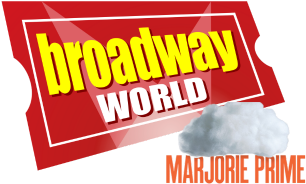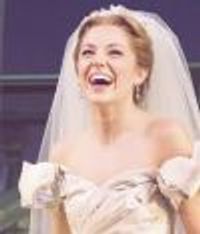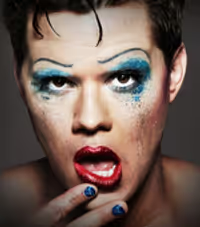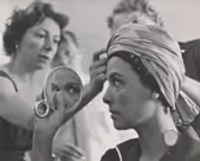Actors With Unhealthy Singing Technique?
SporkGoddess
Broadway Legend Joined: 7/27/05
#50Actors With Unhealthy Singing Technique?
Posted: 7/11/20 at 10:28am
I think LBB was a combo of both a voice shredding role and not-great technique, but I'll let the experts chime in.
Reading through this thread and saw Ruthie Henshall's name. I haven't heard her sing in quite some time (not that I was looking for her either) so out of curiosity I turned to YouTube to hear what her voice sounds like nowadays and found this ... "I Still Believe" (Lytham Festival) ... yikes.
Thanks for sharing because I hadn't heard her sing either. In fact, I assumed based on this thread that she wasn't really doing much singing anymore. Definitely yikes! It's interesting to contrast her with Lea, who to my knowledge has wonderful technique.
SporkGoddess
Broadway Legend Joined: 7/27/05
#51Actors With Unhealthy Singing Technique?
Posted: 7/11/20 at 10:28am
I think LBB was a combo of both a voice shredding role and not-great technique, but I'll let the experts chime in.
Reading through this thread and saw Ruthie Henshall's name. I haven't heard her sing in quite some time (not that I was looking for her either) so out of curiosity I turned to YouTube to hear what her voice sounds like nowadays and found this ... "I Still Believe" (Lytham Festival) ... yikes.
Thanks for sharing because I hadn't heard her sing either. In fact, I assumed based on this thread that she wasn't really doing much singing anymore. Definitely yikes! It's interesting to contrast her with Lea, who to my knowledge has wonderful technique.
JennH
Broadway Legend Joined: 11/14/13
#52Actors With Unhealthy Singing Technique?
Posted: 7/11/20 at 11:27am
Luminaire2 said: "Laura Bell Bundy really did struggle in her Legally Blonde run. No idea if it was technique or just a voice shredder of
a role.
"
Def more a voice shredder. She doesn't have the greatest technique on the planet but this role is absolutely all wrong in terms of vocal pedagogy. Many Elles who came after said the same. If you wanna know why there was a "reality" show to search for a new Elle after LBB, this was why.
MattieIce2018
Leading Actor Joined: 5/8/19
#53Actors With Unhealthy Singing Technique?
Posted: 7/11/20 at 12:30pm
JennH said: "Luminaire2 said: "Laura Bell Bundy really did struggle in her Legally Blonde run. No idea if it was technique or just a voice shredder of
a role.
"
Def more a voice shredder. She doesn't have thegreatest technique on the planet but this roleis absolutely all wrong in terms of vocal pedagogy. Many Elles who came after said thesame. If you wanna know why there was a "reality" show to search for a new Elle after LBB, this was why."
If I remember correctly, So Much Better (as well as sections of a few of Elle’s other songs) was brought down a half step after LBB left and has been that way for pretty much all subsequent productions (and in the version of the score MTI sends to regional groups). Still a difficult role to sing, but it seems like they were aware of the issue and tried to mitigate it at least a little when they saw the damage it did
Loopin’theloop
Leading Actor Joined: 1/9/18
#54Actors With Unhealthy Singing Technique?
Posted: 7/12/20 at 8:46am
broadwayboy223 said: "A big problem is the fact a lot modern vocal pedagogy is inherently not functional. For example “placement”. People are taught to “place” their voices in certain areas. Why it doesn’t work is that the vocal folds come together and resonate throughout the skull, you can’t physically place your voice anywhere. Yes, you’re going to feel sensations when you sing, even vibrations-but you can’t go for that feeling, you can’t force it.
Usually what happens when people “place” their voices is tension and nasality.
Just my two cents (I’m sure people will disagree with me). "
It’s very interesting to read this as I think it’s exactly the opposite. What you described - singing being taught by sound mimicry and visualisation, is very old fashioned. It is of course going to depend on where a person is studying but in the major training institutions modern singing technique is all based on anatomy - learning how to anker the voice using your body along side breathing, the movement of the larynx, titling the thyroid all that stuff. Singers of the 80s and earlier certainly learned the old way and it shows with many of their voices.
#55Actors With Unhealthy Singing Technique?
Posted: 7/12/20 at 6:50pm
I think that an important discussion needs to be had about what is asked of performers doing 8 shows a week(and press appearances). Audra, who we all know has stunning technique and the very best training, nearly ruined her voice forever doing Porgy and Bess. She had a vocal hemorrhage and though that she would never sing again. As other people have mentioned, it is so often an issue, especially now as broadway has lost mainstream popularity, of singers being pushed too far regardless of technique.
#56Actors With Unhealthy Singing Technique?
Posted: 7/14/20 at 12:44amSomeone enlighten me as to what happened to Allison Fraser’s voice. She seems to have some damage from years of possible improper technique that other women her age don’t seem to have. When I saw her in Dear World I was shocked by how poorly she sounded, it even seemed she had trouble maintaining her speaking voice.
broadwayboy223
Broadway Legend Joined: 7/2/14
#57Actors With Unhealthy Singing Technique?
Posted: 7/14/20 at 12:51am
Loopin’theloop said: "broadwayboy223 said: "A big problem is the fact a lot modern vocal pedagogy is inherently not functional. For example “placement”. People are taught to “place” their voices in certain areas. Why it doesn’t work is that the vocal folds come together and resonate throughout the skull, you can’t physically place your voice anywhere. Yes, you’re going to feel sensations when you sing, even vibrations-but you can’t go for that feeling, you can’t force it.
Usually what happens when people “place” their voices is tension and nasality.
Just my two cents (I’m sure people will disagree with me). "
It’s very interesting to read this as I think it’s exactly the opposite. What you described - singing being taught by sound mimicryand visualisation, is very old fashioned. It is of course going to depend on where a person is studying but in the major training institutions modern singing technique is all based on anatomy - learning how to anker the voice using your body along side breathing, the movement of the larynx, titling the thyroid all that stuff. Singers of the 80s and earlier certainly learned the old way and it shows with many of their voices.
"
Having had enough voice teachers to last a life time (currently studying Musical theatre in college) I can tell that this “old school” way is still prevalent. I’ve worked with the the science/anatomy based teachers too and much prefer it! The other school of thought is still definitely kicking tho!
davp
Chorus Member Joined: 1/27/13
#58Actors With Unhealthy Singing Technique?
Posted: 7/14/20 at 1:56pm
Every time I listen to Harvey Fierstein sing, I wonder how he could possibly not be destroying his voice.
#59Actors With Unhealthy Singing Technique?
Posted: 7/14/20 at 2:17pm
davp said: "Every time I listen to Harvey Fierstein sing, I wonder how he could possibly not be destroying his voice."
He has done plenty external damage to his instrument, but what we hear as the gravel and buzz in his voice is from overgrown vestibular folds. So if someone writes a script where ethnic Tuvans teach a white man how to throat sing, we know who to call.
https://www.cbsnews.com/news/harvey-fierstein-no-longer-an-activist/
https://en.wikipedia.org/wiki/Vestibular_fold
Tuvan Throat Singing (YouTube)
baritonewithtenortendencies
Understudy Joined: 4/21/23
#60Actors With Unhealthy Singing Technique?
Posted: 1/22/24 at 9:04am
qolbinau said: "I don't think Bernadette Peters is known for having particularly strong/classical vocal technique, although I believe she describes a shift in her technique when she learned how to sing "Song & Dance" 8 shows a week.
Not sure how controversial/wrong this is, but Iwonder though if prestine vocal techique can sometimes take some of the expressiveness and individuality out of voices though. Kelli's "To Build a Home" is one of my favourite performances ever, and I love me some Audra - but there is something thrilling and exciting about the sound of raw voices like Bernadette Peters or Alice Ripleytearing through songs."
(Sorry for necropost, but I love this thread!)
As an aspiring opera singer, I absolutely agree that raw voices can add a lot to a song's emotion in musical theatre
Now, if it's Les Mis, you better not cast a Jonas brother who can't keep up an operatic sound or a Ramin Karimloo who totally can but chooses not to
But in a Sondheim show, for example, as long as you're singing the right notes it's mostly whatever you want
He's so accomadating for actors in his scores, unlike Andrew Lloyd Webber or Stephen Schwartz or Pasek and Paul
Like Sondheim rights some crazy passages but never does he write a role that rips up your vocal chords
And Bernadette's voice is a voice that is incredible at diction and drama and very interesting musically
Often, her technique will actually be excellent, but that is not the thing her voice is known for at all
She's so husky and even raspy at times, with her voice sounding a bit like a cross between a prima donna soprano and a teenage boy
It's a bizarre and contradictory sound, but it lets her get away with stuff that people like Audra or Kristin never could
Bernadette's voice is also odd because she's definitely a soprano but she's one of the only sopranos who's basically always a belter
I heard that her mother had polyps that made her voice funny and Bernadette kind of copied her mom, but not on purpose or anything it just happened
#61Actors With Unhealthy Singing Technique?
Posted: 1/22/24 at 9:45am
What happened to Elaine Paige’s voice?
To me, it always sounds so nasal. As if her sinuses have been totally blown out, even just her regular speaking voice. Am I wrong? She still continues performing.
#62Actors With Unhealthy Singing Technique?
Posted: 1/22/24 at 2:21pm
Lea Salonga damaged her voice during the original West End run of Miss Saigon and had to be taught how to sing from various parts of her body in order to maintain a healthy instrument.
#63Actors With Unhealthy Singing Technique?
Posted: 1/22/24 at 4:24pm
Luminaire2 said: "Laura Bell Bundy really did struggle in her Legally Blonde run. No idea if it was technique or just a voice shredder of
a role.
"
It's a voice shredder and they're quite proud of it. I remember listening to a podcast about it where someone involved said "we wrote a show that's harder to sing than Gypsy" and he sounded so gleeful about it, as if a role being hard to sing was a marker of anything.
#64Actors With Unhealthy Singing Technique?
Posted: 1/23/24 at 3:45pm
There has been no mention to the effect of singing with or without a microphone.
Surely with all the audio electronics these days to 'support' the voice the damage would be manageable.
Is it breath control-again support-the reason that opera trained voices don't need a microphone and can still reach the back of the stalls?
There is mentioned here of the early great composers and I presume that their music was more melodic[High Society] and did not contain big belting 11 o'clock numbers. Those early shows would have been pre microphone so how did those voices sustain and fill a theatre with sound?
Mary Martin. How did her voice last so long? Was it because she never had to 'belt'?
baritonewithtenortendencies
Understudy Joined: 4/21/23
#65Actors With Unhealthy Singing Technique?
Posted: 1/23/24 at 4:01pm
JennH said: "Luminaire2 said: "Laura Bell Bundy really did struggle in her Legally Blonde run. No idea if it was technique or just a voice shredder of
a role.
"
Def more a voice shredder. She doesn't have thegreatest technique on the planet but this roleis absolutely all wrong in terms of vocal pedagogy. Many Elles who came after said thesame. If you wanna know why there was a "reality" show to search for a new Elle after LBB, this was why."
Laurence O'Keiff is almost as sadistic as Andrew Lloyd Weber with his vocal lines
I want to say that I do not in any way think this is a good thing, I think it's horrible
Boyboy and Heathers both give men G5's
Heathers gives multiple female characters G5's (albeit they can technically just not do them but a lot of people I've seen have been pressured into it by people thinking they're weak vocalists if they don't)
And Legally Blonde is hardly easier than anything else he's written
SweetLips22 said: "Mary Martin. How did her voice last so long? Was it because she never had to 'belt'?"
You're kind of onto something. I mean, it may be easier breath wise to belt, but what actually happens when somebody sings up there with that tone is they stretch out and tense their vocal chords. That's why it's harder to vibrate. It's not very good for your voice to do that constantly. It may be more demanding to sing operatically, but it's ultimately a lot easier on your vocal cords because of where the sound comes from.
Now, Ethel Merman was a belter and her voice was similarly sustained and could carry over bands with no microphone
It is possible, if belting only in the place it's most comfortable for the individual, to sustain it
Michael Rupert is a bit of a belter, but notice he never belts higher than a G
He has a few recorded G#'s and A's but they are basically always sung legit or softly
Then you have Ben Platt, who has recordings of belting up to an E5
And you listen to different eras of his voice and realize that he's definitely damaged his voice
I mean listen to his incredible high A's in Book of Mormon and then go over to Dear Evan Hansen...
That show is absurd
Every actor inexplicably belts the high notes and it does not help them
But a lot of it is also about...
I can't find the post for some reason
But it's about the eight show a week thing
In opera, you'd usually do like six shows a week at the max
Usually, you'd have a day between most shows, and only do two days in a row once or twice a week
So that's five or six shows
Really, for demanding roles that are onstage all the time, they should be 6 shows a week at the most
Evan Hansen has an alternate, which is good, but for some reason Elphaba and Glinda don't, even though they're similarly demanding
And Christine gets an alternate, which is good, but for some reason there's no alternate for Bess in Porgy and Bess????
Eight shows a week for an opera
Is unthinkable
Porgy and Bess
Is an opera
Shows like Les Mis and Jesus Christ Superstar need alternates for the leading roles, too
I mean eight shows a week as Valjean or Judas is a sure fire way to ruin your voice
chrishuyen
Broadway Legend Joined: 11/12/14
#66Actors With Unhealthy Singing Technique?
Posted: 1/23/24 at 4:18pm
Actual opera is also different in that the opera houses are built with these acoustics in mind--that's why they often look different than Broadway houses. Also, before microphones, I believe a lot more attention was paid to the orchestration and making sure that the orchestra wouldn't drown out the singer. Now, with things like drum sets and electric guitars being standard in musicals, it's assumed that the singer will be mic'ed so there's less concern over that too. Also in general for modern audiences, I'd say belting a high note (or belting overall) is more of a crowd pleaser so that's what composers write for, even if it's not as sustainable in the long run (the American Idol-ification of Broadway, so to speak). I'm not sure if the older musical composers/opera composers just knew more about vocal pedagogy, but it seems like a lot of modern scores rely on just "impressive" vocal moments that can't necessarily be done 8 times a week for long periods of time (especially for singers who don't know how to take care of their voice).
Jarethan
Broadway Legend Joined: 2/10/11
#67Actors With Unhealthy Singing Technique?
Posted: 1/23/24 at 4:43pm
SweetLips22 said: "There has been no mention to the effect of singing with or without a microphone.
Surely with all the audio electronics these days to 'support' the voice the damage would be manageable.
Is it breath control-again support-the reason that opera trained voices don't need a microphone and can still reach the back of the stalls?
There is mentioned here of the early great composers and I presume that their music was more melodic[High Society] and did not contain big belting 11 o'clock numbers. Those early shows would have been pre microphone so how did those voices sustain and fill a theatre with sound?
Mary Martin. How did her voice last so long? Was it because she never had to 'belt'?
I saw Mary Martin live three times, twice for I Do I Do and once in London for Hello Dolly on a family vacation. I was also in my mid-teens all three times. I listened to the SOM, South Pacific and I Do albums many times (I Do had a really charming score) and saw Peter Pan countless times. I was underwhelmed by her singing pretty much all the time, not because she couldn't sing the songs, more because IMO she brought nothing special to them. I have no way of proving it, but I always assumed that Mary Martin was a great star more because of her acting (text and songs) and charisma, aided by her ability to sing a song adequately.
I really don't think age had anything to do with it, her voice in I Do didn't seem any different from her voice in Peter Pan and, admittedly to a teenager, the songs didn't seem hard to sing, except maybe Flaming Agnes.
BeingAlive44Ever
Featured Actor Joined: 5/26/23
#69Actors With Unhealthy Singing Technique?
Posted: 1/23/24 at 7:07pm
chrishuyen said: "Actual opera is also different in that the opera houses are built with these acoustics in mind--that's why they often look different than Broadway houses. Also, before microphones, I believe a lot more attention was paid to the orchestration and making sure that the orchestra wouldn't drown out the singer. Now, with things like drum sets and electric guitars being standard in musicals, it's assumed that the singer will be mic'ed so there's less concern over that too. Also in general for modern audiences, I'd say belting a high note (or belting overall) is more of a crowd pleaser so that's what composers write for, even if it's not as sustainable in the long run (the American Idol-ification of Broadway, so to speak). I'm not sure if the older musical composers/opera composers just knew more about vocal pedagogy, but it seems like a lot of modern scores rely on just "impressive" vocal moments that can't necessarily be done 8 times a week for long periods of time (especially for singers who don't know how to take care of their voice)."
Yeah, you're correct that opera houses are built differently. They're built to where the singers on stage literally have their voices thrown over the audience, so it helps them out a lot
I think that it's generally unexciting for people to hear operatic high notes compared to belted ones when they aren't familiar with music or opera, yes
Like, for me, a healthy baritone high G held for maybe four bars that sounds like a part of the same register as his low A is way more exciting than a tenor belting a slightly flat high C held for eight
Like compare Stephen Bogardus's climax of The Games I Play to literally any modern musical's male solos' climaxes
To me, it's more colorful and impressive
To some people, it might be overwhelming or they just might like the higher notes better
It's actually not all that different from opera, though
I mean, ever wonder why most composers wrote so often for tenors and sopranos?
It's because baritone and mezzo high notes weren't as high, so even when they were equally inpressive, they'd rather have that tone that comes with the higher voices
A lyric tenor's highest notes sound thinner than a dramatic tenor's, but most people who don't know the difference prefer a lyric tenor's high note because it sounds higher and in most people's minds higher=more impressive
But a dramatic tenor high B compared to a lyric tenor's is much fuller and often stronger
In a lot of cases, I think it's more about sounding impressive than being impressive
Any old slightly trained baritone can fake a high C
But it'll rip up their vocal cords
And that's exactly what happens
The Rural Juror
Understudy Joined: 6/2/15
#70Actors With Unhealthy Singing Technique?
Posted: 1/24/24 at 9:28am
BeingAlive44Ever said:
"In a lot of cases, I think it's more about sounding impressive than being impressive"
I honestly think this is why a lot of the general populace thinks of Idina Menzel as a peak vocalist. Nearly every other Elphaba/Elsa sings circles around her, but she sounds like she's singing "more" because it's more of a struggle for her. Therefore it's mre "impressive", as you said.
#71Actors With Unhealthy Singing Technique?
Posted: 1/24/24 at 11:01pm
I listened to a recent recording of Sierra Boggess and Julian Ovenden - wow talk about rough! The young voice is quite remarkable because one can push it to its limits and beyond with quite remarkable success. However, the singers will eventually pay a price. The entertainment world is full of them, and the exceptions like Johnny Mathis and others who are still singing quite well into old age are the exceptions.
Videos









